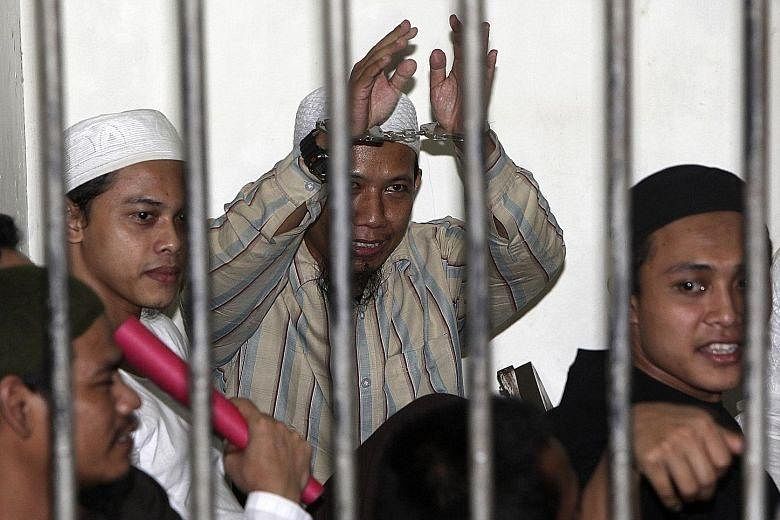JAKARTA - Indonesian police have officially declared radical Islamic cleric Aman Abdurrahman a suspect and charged him with orchestrating the terrorist attack in Jakarta on Jan 14 last year, which left four bystanders dead.
The move, which The Straits Times confirmed with the Indonesian police on Tuesday (Aug 22), marks a major breakthrough in the case, which up until last week, had largely revolved around the convictions of a handful of low-level militants, who played minor support roles in the attack.
"Aman was involved in the Thamrin attack," said police spokesman Brigadier-General Setyo Wasisto, referring to Jalan M. H. Thamrin, the road where the attack took place. "He gave the directive, supported and guided it."
The police had, early in its investigations last year, fingered Aman for the attack, saying he had ordered his followers to mount the strike from prison, where he was serving a 10-year jail term for funding a Jemaah Islamiah (JI) paramilitary training camp in Aceh.
The auhorities found several mobile phones, during an impromptu check, concealed inside Aman's cell following the Jan 14 attack. Aman and other high profile terrorist inmates were then permanently moved to isolation cells.
Gen Setyo confirmed that Aman was picked by the police on Aug 12 and officially declared a suspect on Aug 18, after he was granted special remission from his jail sentence as part of Indonesia's Independence Day celebrations last week.
When asked if Aman, who is the leader of the Jemaah Ansharut Daulah (JAD) militant group, will be brought to court to face charges, Gen. Setyo said, "Yes, he will be brought to trial soon."
More than 92,800 prisoners were given remissions of various lengths and released as Indonesia marked 72 years of independence from Dutch rule. Aman was among 35 inmates jailed for terrorism-related offences to receive remission, and five months was taken off his sentence.
Many were surprised that Aman, who was also a key player in the JI terrorist network and had pledged his allegiance to the Islamic State in Iraq and Syria (ISIS) while he was in jail, was given time off his sentence.
Besides his alleged role in last year's attack in the capital, he is also linked to several other terrorist attacks in Indonesia, including the twin suicide bombings in East Jakarta on May 23, which killed three policemen.
The remission system in Indonesia was adopted to encourage prison inmates to behave and avoid disorderly behaviour while serving time behind bars.
The process, however, has its critics, with the latest reflected in the findings of a study by the Indonesian Ombudsman, which indicated that graft still played a major role in whether a prison is given remission.
The prospect of Aman facing charges for the Jakarta attack was welcomed by counter-terrorism observers. But most say it is not expected to turn the tide in Indonesia's war on terror as pockets of militant cells, mostly with loose ties to ISIS and operating independently, still pose a threat.
"Aman is an ideologue, and his role is more about inspiring the militants and connecting those operating in different places to work together on attack plans," said counter-terrorism analyst Taufik Andrie.
The director of the Jakarta-based Institute for International Peace Building believes terror attacks would continue whether Aman is in or out of prison, adding that he does not expect Aman to be given a heavy jail term for his role in the attack on the capital.
"Evidence against Aman may be weak because he was inside prison during the attack, and his involvement only went as far as him granting his blessing, and guidance," said Mr Taufik.


